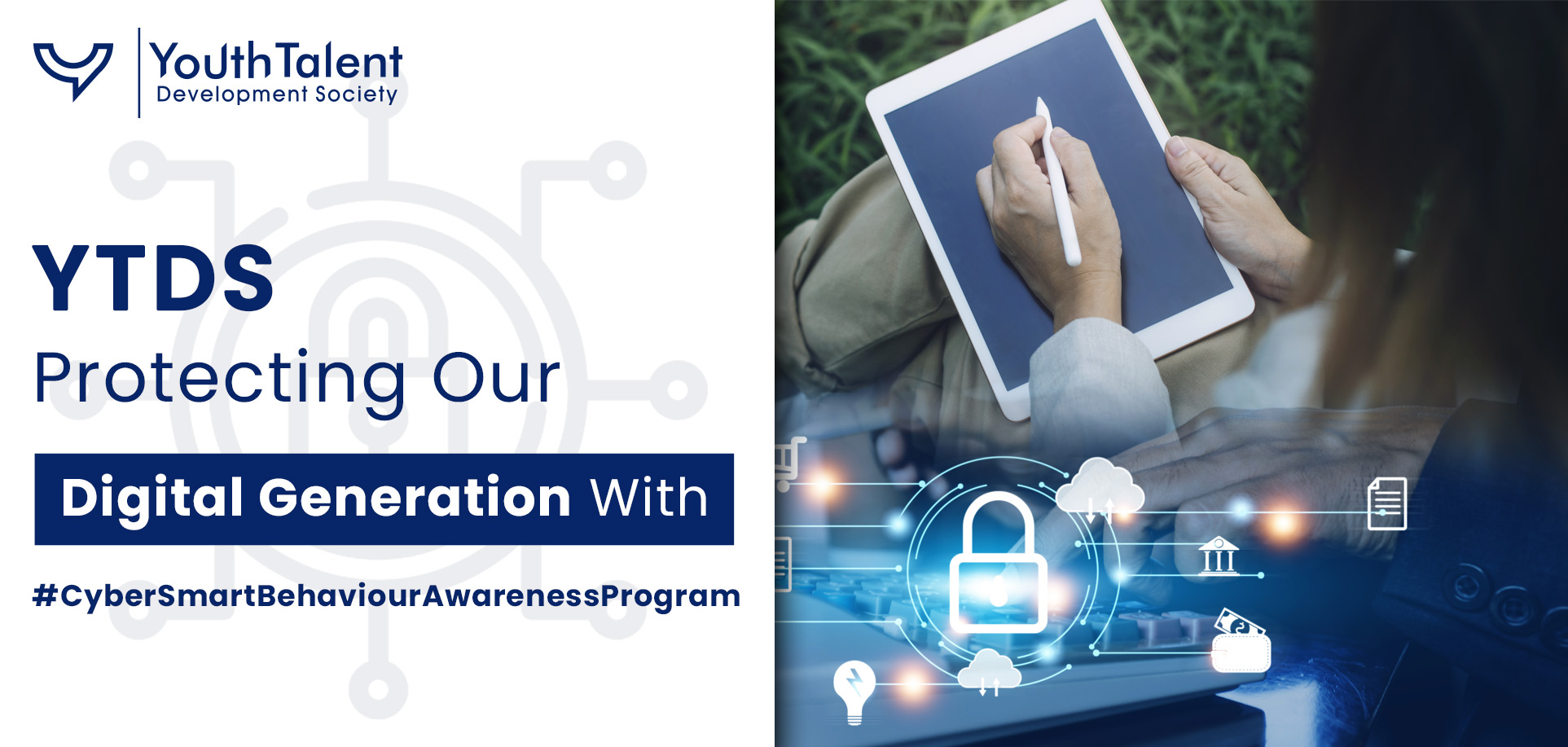
YTDS - Protecting Our Digital Generation With #CyberSmartBehaviourAwarenessProgr am
Connecting is advent of the twenty-first century. Every facet of our biographies today is composed in virtual. Internet banking or social networks use digitalisation for their needs and thus depend technical advances every time. But, at the same time, this eases our lives, turning them into easy prey for various hackers. Basic to take online safety measures since today’s cyberspace demands it. YTDS’s #CyberSmartBehaviourAwarenessProgram strives to provide knowledge on how one can be cyber-smart among the youth and quite adept in internet domain.
Understanding Cyber Threats
For diving into cyber-smart practices it’s a must that we understand the commonplace threats that we encounter online. Each of these threats has serious implications and awareness is the first step towards preventing them.
- Phishing:
- Malware:
- Ransomware:
- Identity Theft:
- Online Harassment:
- Deepfakes:
- IoT Vulnerabilities:
One of the most rampant forms of cyber-attacks is phishing which involves efforts to get personal details like usernames, passwords, about credit cards through fake emails or messages. Cybercriminals often masquerade as trustworthy people like banks or reputable companies so as to trick individuals into revealing important details. This makes falling for a phishing attack resulting in identity thefts, financial losses or even unauthorized entrance into personal accounts.
Spyware, Trojans, worms, viruses are different types of malware that are created with an intention to invade, destroy or incapacitate computers, networks and mobile devices. After being installed on any device, spyware abilities can be used to rob important information from someone’s computer system, disturb files or simply take over a device’s operating system completely. The repercussions here could mean annoying ads popping in every time you surf the internet or ending up with heavy losses in finances as well as loss of important data.
Ransomware is one very harmful class of malware that encrypts the victims’ files rendering them unusable until certain amount of money is paid. Payment requests in cryptocurrencies are often made by cyber criminals which makes it tough for authorities to trace them. Even if a victim pays the ransom amount, chances are that he/she may not access his/her files again. Ransomware attacks have hit everyone from private persons to enterprises and also governmental agencies causing huge disruptions and losses in cash.
Identity theft is when someone uses another person's personal details like their name, social security number or credit card information without obtaining consent from the owner. The misused data is frequently associated with acts of dishonesty including new account openings as well as wrongful purchases and even loan applications that are fraudulently made by unidentified individuals who stole someone’s identity. Individuals who fall prey to this crime may endure lasting effects such as poor credit ratings and instability in funds.
Usual forms of online harassment are including cyberbullying and stalking. It has become a point of concern in a growing society where everything appears digital. Thus, such harassment can be associated with sending messages that threaten someone, circulating false information about another person or even humiliating them through the internet. This anonymity, however, has enabled offenders to be bolder when perpetrating these acts and it is hard to trace them down so as they can face justice. Online harassment is the source of psychological disturbances like Anxiety disorders depression hence driving some victims into committing suicide.
Deepfakes are images or videos fabricated with AI that help mislead people, influence their views, or hurt them if used. Depending on how fast deepfake tech has improved, distinguishing between actual content and faked one has become more complicated every day. In the light of personal reputation, political stability, and public faith in the media, deep fakes can be identified as a major danger.
Being a group of connected devices using the internet, the Internet of Things (IoT) is made up of different appliances such as smart homes, wearables and security systems. If misused, although they have their advantages in terms of convenience; they can turn out to be quite dangerous due to poor security measures that leave them open to hackers who are able to gain private information rendering it vulnerable. It is possible for a cyber criminal to make use of an IoT device in breaking into the larger network of an organization through which he/she can launch subsequent widespread attacks.
CyberSmart Practices: A Checklist
To protect yourself from these threats, it's essential to adopt cyber-smart practices. Here’s a checklist to help you stay secure in the digital world.
- Strong Passwords
- Regular Updates
- Beware of Phishing Attempts:
- Secure Wi-Fi Networks:
- Two-Factor Authentication (2FA):
- Online Shopping Safety:
- Protect Your Devices:
- Online Harassment: Know Your Rights:
For protecting your online accounts, one of the most effective ways is creating strong passwords with a complex structure. A strong password usually contains both capital and small letters, numeric symbols, as well as some unique characters. For instance, don’t put down your date of birth or any popular word when forming such a key. You may also want to think about utilizing a password manager that can help you keep them safe. Additionally, it’s advisable that each web-based resource has its own pin code so as minimize the chances of losing everything when one gets hacked in any way.
Updating the software, operating system and applications is vital for security. Many software updates contain patches for vulnerabilities cybercriminals can exploit. Thus, always updating your devices means they have the latest security features and protections enabled. Besides, enabling automatic updates can help one stay protected without having to remember doing so manually.
Recognizing phishing attacks can be challenging, however, there are ways to protect yourself. Be careful while reading emails or messages from unknown senders, especially if they solicit for personal information or contain dubious links or appendices. Always confirm the sender’s identity prior to clicking on anything or giving out any information. In case of doubt, contact the organization directly through official channels as opposed to replying to a message.
If you want to protect your online activities, it is very important to use a secure and encrypted Wi-Fi network. Ensure that your home Wi-Fi is the one that maximally benefits from a strong password protection with WPA3 encryption. Always avoid using public Wi-Fi for sensitive matters like online banking or shopping because such networks are more exposed to attacks. However, if you absolutely have to use public Wi-Fi use a virtual private network (VPN) in order to keep all your internet traffic encrypted.
Two-step authentication (2FA) gives an extra level of safety for your online accounts by needing second means of verifying in addition to your password. This might be a code which comes to your phone, a fingerprint scan or even a hardware token. Thus, enabling 2FA on important accounts like email and banking can really limit the unauthorized access risks, even though they get hold of your password.
When shopping online, it is crucial to ensure that one does so via secure sites which begin with "HTTPS" and also contain the padlock symbol within their address boxes. These are indications that the website encrypts your data, thereby preventing interception thereof. To avoid being harmed by the cons with some deals which sound too good to be true, always share less personal information than required. For safer online purchasing make use of a credit card more so than utilizing a debit card since credit card purchases can be protected from theft better than debit card purchases.
The basic yet essential principle for protecting machines from virus infection is installing antivirus programs and keeping them up-to-date. Besides, if they have any private data whose security must be upheld, turn on screen locks as well as encrypt the device. Regular data backups serve a purpose of guarding individuals against losing information as a result of malware attack or hardware damage.
In case you have to suffer from web persecution, it is highly essential that you be versed with your privileges and act correspondingly. Ensure that you take photos of the happenings and save any pertinent messages with you. File a report on the platform where the harassment took place, if need be; even approach the police. There are laws on cyberbullying in the majority of nations, which means other than just getting advised, you are entitled to protection as well as retribution for having gone through such experience.
CyberSmart for Kids
Nowadays it is crucial to educate kids on cyber safety. With education and entertainment getting more online, children should be endowed with the understanding and skills necessary for their own security.
- Start Early
- Use Age-Appropriate Language
- Set Boundaries
- Open Communication
Start teaching kids the basic ideas of cyber safety while they are still very young. They should be encouraged to protect their private information as well as know about possible dangers found online. Be sure to use plain, kid-friendly words when explaining these risks and ways to evade them.
Using language and examples that children can easily understand when talking about cyber threats. For younger children, you may liken cyber threats to stranger danger in the physical world. However, as they get older, you should introduce more complex ideas like phishing and malware related to their online engagements.
You should set out explicit guidelines for internet use, including what websites are permitted and how long a person can stay online. Children should be encouraged to use electronic gadgets in shared spaces within the house as this will allow you to keep an eye on their conduct when they are surging with speed on the Internet. It is essential that children grasp the significance of these regulations aimed at ensuring their security.
Create an environment where your children can speak openly about their online experiences without fear of any repercussions and thus help them understand that they can talk to you anytime they have anything bothering them in onlinespaces. Discuss their online activities often with them and teach them how to identify these ever evolving threats when they show up.
Building a Safer Digital World with YTDS
We realize how important it is to make sure that there is a safer digital environment for everyone at YTDS. Through our ongoing #CyberSmartBehaviourAwarenessProgram, we have been able to reach out to more than one lakh students all over Maharashtra and empower them with the skills and knowledge they need to confidently navigate the online world. Our campaign extends beyond Maharashtra with an aim to reach out to many individuals in India, thereby creating a generation of digital citizens who are smart.
The #CyberSmart campaign focuses on educating students through interactive workshops, online resources like edutaining games and fun films, as well as information sessions about:
- Understanding Cyber Threats: Recognizing common online dangers like phishing and malware.
- Cyber Hygiene Practices: Implementing strong passwords, secure Wi-Fi usage, and responsible online behavior.
- Data Privacy: Learning the importance of protecting personal information online.
- Cyberbullying and Online Harassment: Grasping the effects of and tactics to fight against digital badmouthing.
- Safe Social Media Practices: Building responsible habits for interacting on social media platforms.
By equipping young minds with these essential skills, YTDS aims to create a ripple effect of cyber awareness that would ultimately lead to a safer neater future digitally for all.
Conclusion
Amidst the digital era, which has made online interactions part of everyday life, being cyber-smart is not an option but rather a necessity. The #CyberSmartBehaviourAwarenessProgram that is supported by YTDS seeks to create a secure internet environment through educating people, particularly the youth, on the significance of cybersecurity. By understanding the threats we face and using best practices, we will protect ourselves and promote a sounder cyber community. Let’s join hands to create stronger and more resilient online community! Spread this blog post and the latest buzz around #CyberSmart among your friends and family members. Expect more tips as well as resources that will help you surf in the cyberspace with confidence.


